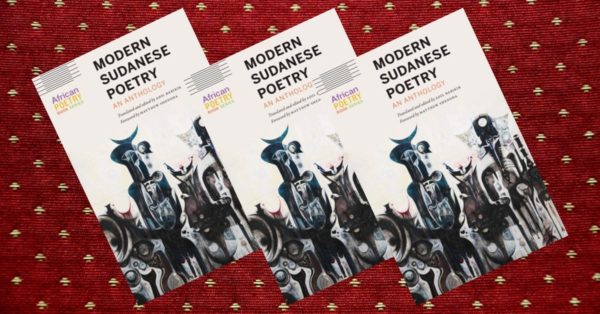
Modern Sudanese Poetry: An Anthology, translated and edited by the Sudanese poet Adil Babikir, was published in paperback in September 2019, as part of the University of Nebraska Press’ African Poetry Book Series. The 186-page book, which comes with a foreword by the Egyptian poet Matthew Shenoda, who served as its supervising editor, was named among our Notable Books of 2019.
Babikir is the translator of Tayeb Salih’s Mansi: A Rare Man in His Own Way and two novels by Abdelaziz Baraka Sakin. Shenoda’s latest poetry collection is Seasons of Lotus, Seasons of Bone.
Here is a description of the anthology:
Spanning more than six decades of Sudan’s post-independence history, this collection features work by some of Sudan’s most renowned modern poets, largely unknown in the United States. Adil Babikir’s extensive introduction provides a conceptual framework to help the English reader understand the cultural context. Translated from Arabic, the collection addresses a wide range of themes—identity, love, politics, Sufism, patriotism, war, and philosophy—capturing the evolution of Sudan’s modern history and cultural intersections.
Modern Sudanese Poetry features voices as diverse as the country’s ethnic, cultural, and natural composition. By bringing these voices together, Babikir provides a glimpse of Sudan’s poetry scene as well as the country’s modern history and post-independence trajectory.
The anthology comes with some praise. Salah M. Hassan, professor of Africana Studies at Cornell, describes it as “an unprecedented accomplishment not only in translation of modern Sudanese poetry but also scholarship on its history, evolution, poetics, and aesthetics.” It is “a great addition to the library of Arab poetry in translation that should appeal to scholars and the general public with interest in Arabic poetry.”
Fady Joudah, the Palestinian American author of the poetry collection The Earth in the Attic, also provides a blurb:
Sudanese literature has long been a significant contributor to Arabic and world letters and culture. The thoughtful, provocative introduction in this anthology, combined with the clear-eyed lyric transformation of the poems into English, honor poetry everywhere. Just as in Iraq, Yemen, Morocco, or the United States, the weight of collective history and ethnic and linguistic diversity emerges to forge these Sudanese poems into art, both bound to and liberated from the national frame. Details matter, nuance is essential. And yet the story of Sudanese poetry is the story of poetry all over the world. From blaze to breeze, this is a beautiful book.
Buy Modern Sudanese Poetry: An Anthology HERE.









COMMENTS -
Reader Interactions